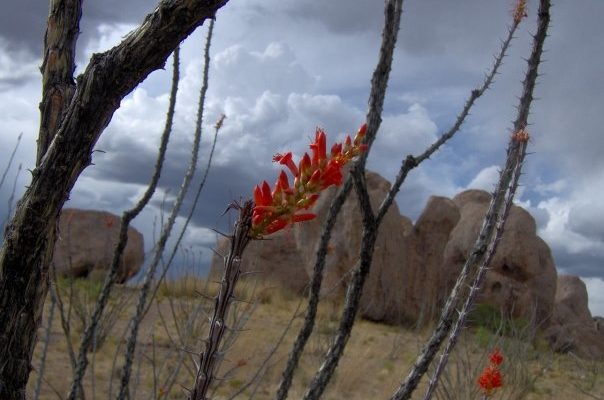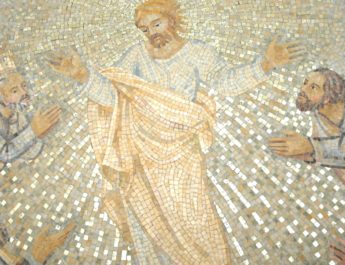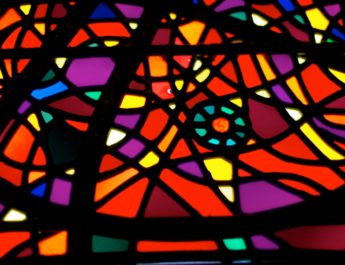Isaiah 35:1-10
Advent A3
1The wildernessA and the dry landB shall be glad,C
the desertD shall rejoiceE and blossom;F
like the crocusG 2 it shall blossom abundantly,H
and rejoiceI with joyJ and singing.K
The gloryL of LebanonM shall be given to it,
the majestyN of CarmelO and Sharon.P
They shall see the glory of the Lord,Q
the majesty of our God.R
A “wilderness” = midbar. From dabar (to speak, answer, declare, give, command). This is desert, wilderness, south, speech. Can be land on which to drive cattle or a desert. In Judaism, following the Hebrew, the book of Numbers is called Bemidbar (“in the wilderness”).
B “dry land” = tsiyyah. 16x in OT. This can be dryness, drought, desert, parched land, desert, wilderness. Properly, it’s aridity; concretely desert land.
C “glad” = sus. Properly, to be bright – so, cheerful or glad, exulting or rejoicing.
D “desert” = arabah. From the same root as arab (desert plateau, Arabaia) OR from arab (to grow dark or become evening) OR from arab (to take on pledge, exchange, intermingle, to trade by barter). This is a steppe or desert plain – one specifically called Arabah, which is south of the Sea of Galilee.
E “rejoice” = gil. This is to rejoice, be joyful or glad, exult, cry. It is when strong emotion causes one to spin around so it can be used of rejoicing as well as under strong fear.
F “blossom” = parach. To bud, sprout, flourish. To bloom or to spread.
G “crocus” = chabatstseleth. 2x in OT – here and in Cant 2:1 “I am a rose of Sharon.” This is meadow saffron, crocus, a rose.
H “blossom abundantly” = parach twice as in v1. In the verse, the first parach is in the Infinitive Absolute, which is a tense used to intensify a verb or to make it emphatic. (Think Foghorn Leghorn “Now, I said, I said…”). Could be rendered “Blossom, it shall blossom…”
I “rejoice” = gil. Same as “rejoice” in v1. There is also an untranslated word here: aph. It means also, furthermore, yet, even.
J “joy” = gilah. 2x in OT. Related to “rejoice” in v1. From gil (rejoicing, gladness, joy, an age); from gil (see note E above). This is rejoicing or joy.
K “singing” = ranan. Properly, making a harsh or shrill sound. To shout, generally for joy. This is a ringing cry, cry aloud, joyfully sing, rejoice.
L “glory” = kabod. From kabad (to be heavy, weighty, burdensome). This is weighty. Figuratively, glorious, abundant, riches, honor, splendor – a reference to one’s reputation or character. This word is often used to describe God and God’s presence.
M “Lebanon” = lebanon. From laben (brick, to be white or make white; to make bricks); OR could be from lebab (heart, inner self, mind, will). This is Lebanon.
N “majesty” = hadar. From hadar (to honor, adorn, respected, glorious, rough places; may mean to swell up literally or figuratively and thus to favor or honor, be high or proud). This is ornament, honor, splendor, beautiful, dignity, majesty. It is magnificence whether from decoration or splendor.
O “Carmel” = karmel. From the same as kerem (vineyard, garden, vines, vintage). Place near Hebrew whose name means fruitful field.
P “Sharon” = Sharon. 7x in OT. From yashar (to be smooth, straight, right, direct, fit, seem good, pleasing; to be straight or even so figuratively to be or make right, pleasant, or prosperous). A place called Sharon whose name literally means plain.
Q “Lord” = YHVH. From havah (to be, become) or hayah (to come to pass, become, be). This is the name of the God of Israel, the self-existent and eternal one, the tetragrammaton. This pronunciation has been lost to time so “Lord” is generally used in its place.
R “God” = elohim. God, god.
3 StrengthenS the weakT hands,U
and make firmV the feebleW knees.X
4 Say to those who are of a fearful heart,Y
“Be strong,Z do not fear!AA
HereBB is your God.CC
He will come with vengeance,DD
with terrible recompense.EE
He will come and saveFF you.”
S “strengthen” = chazaq. To grow strong, strengthen, fasten upon, seize, be strong. Figurative for courageous. Causatively for strengthen, cure, help, repair, bind, restrain, conquer. This is a masculine plural imperative, which means it’s a command to many people (men) to do the strengthening.
T “weak” = rapheh. 4x in OT. From raphah (sink, relax, become helpless, cease, collapse, fail, fall limp, feeble, forsake, let go, wait; to slacken literally or figuratively). This is weak, slack, or a proper name Raphah. Can mean slack in physical or mental sense.
U “hands” = yad. This is hand, ability, power. Hand in a literal sense, but also what one can do or the means by which one does it.
V “make firm” = amets. To be stout, strong, alert, courageous, determined, to harden, increase, make firm, support, take courage, establish, fortify. This is to be alert in body or in mind (as courage or steadfast).
W “feeble” = kashal. To stumble, stagger, totter, bring down, downfall, fail, feeble, weak, bereave, be decayed, be ruined. This is wavering because of weak legs or ankles. It implies faltering, stumbling, fainting, or falling.
X “knees” = berek. From barak (to kneel, bless; to bless God as part of worship or to receive blessing from God; could also be used as a euphemism to describe someone cursing God since God was too holy to curse even narratively).
Y “those who are of a fearful heart” = mahar + leb. Mahar is properly used of liquid flowing freely so it can mean hurrying in a positive sense or fearful hastening in a negative one. Leb is the inner self, mind, will, heart. Heart is always used figuratively in the Old Testament. This would be someone whose heart is fleeing from them or draining away from within them.
Z “be strong” = chazaq. Same as “strengthen” in v3.
AA “do not fear” = al + yare. This phrase or comparable variants is found throughout the Bible in every possible division and section (Torah, Prophets, Writings, Gospels, Acts, Epistles, and Revelation). Yare refers to fear, but also to reverence.
BB “here” = hinneh. This is from hen (lo! Behold!). This is also “indeed, here, surely.” It expresses surprise and/or draws attention to the subject matter
CC “God” = elohim.
DD “vengeance” = naqam. 17x in OT – 13x of God’s vengeance, 4x of human vengeance. From naqam (to avenge, avenger, exact, execute, punish, be vengeful; to bear a grudge and so to avenge or punish). This is vengeance, revenge, quarrel.
EE “recompense” = gemul. 19x in OT. From gamal (to treat someone well or negatively according to what they have done – so, to benefit, requite, or recompense them. To deal with people, reward, repay, bestow on them. Can also mean to ripen or to wean). This is dealing, recompense, benefit, deed. Treatment that one deserves.
FF “save” = yasha. To deliver, defend, help, preserve, rescue, be safe. Properly, to be open, wide or free, which implies being safe. Used causatively, it means to free.
5 Then the eyes of the blind shall be opened,
and the ears of the deafGG unstopped;HH
6 then the lameII shall leapJJ like a deer,
and the tongue of the speechlessKK sing for joy.LL
For waters shall break forthMM in the wilderness,NN
and streamsOO in the desert;PP
7 the burning sandQQ shall become a pool,RR
and the thirsty groundSS springsTT of water;
the hauntUU of jackalsVV shall become a swamp,WW
the grass shall become reeds and rushes.
GG “deaf” = cheresh. 9x in OT. From charash (to be silent, speechless, keep silent, to be deaf)/ This is deaf literally or figuratively or a deaf person.
HH “unstopped” = pathach. This is to appear, open, break forth, draw out, engrave. To open wide literally or figuratively. To loosen, plough, carve, or begin.
II “lame” = pisseach. 13x in OT. From passach (to limp, become lame, hesitate). This is lameness or a lame person.
JJ “leap” = dalag. 5x in OT – “by my God I can leap over a wall (2 Sam 22:30) (Ps 18:29), “look, he comes, leaping over the mountains and bounding over the hills” (Song 2:8), “the lame shall leap like deer” (Isa 35:6), and “I will punish all who leap over the threshold to fill their master’s house with violence and fraud” (Zeph 1:9). This is leap, climb, spring over.
KK “speechless” = illem. 6x in OT. From the same as alam (to bind, tie fast – when applied to the tongue, tongue-tied; so, silent, becoming speechless, or mute). This is unable to speak.
LL “sing for joy” = ranan. Same as “singing” in v2
MM “break forth” = baqa. This is to rend, break, or rip open or to be ready to burst. It could also be to cleave, breach, break in pieces, or invade.
NN “wilderness” = midbar. Same as “wilderness” in v1.
OO “streams” = nachal. From nachal (to take as heritage, inherit, or distribute). This is a river or stream. It could be a wadi or arroyo – sometimes a narrow valley with no water at all, but in strong rains or when winter snow melts, it swells or floods with water.
PP “desert” = arabah. Same as “desert” in v1
QQ “burning sand” = sharab. 2x in OT. This could be burning heat or scorched land. The root may mean to glare so it would refer to the wavy appearance of the air in intense heat.
RR “pool” = agam. 9x in OT. From a root that means to collect water. So, this is a marsh, muddy pool, pond, swamp, standing water. A place where reeds grow.
SS “thirsty ground” = tsimmaon. 3x in OT. From tsame (to be thirsty or thirst literally or figuratively). This is drought or dry ground. A thirsty place, by implication, a desert.
TT “springs” = mabbua. 3x in OT. From naba (to flow, spring, bubble up, pour, gush forth; figurative for speaking good or poor words. Can also mean giving off a bad smell). This is a spring of water, well, or fountain.
UU “haunt” = naveh. From navah (home, keep at home, prepare a habitation; to rest as one does at home; to beautify). This is a habitation, a fold (as a sheep’s fold), a pleasant place, a stable. An abode of shepherd or their flocks. A home and so a place of satisfaction, a place of loveliness. Can also refer to the Temple. Can also refer to homes of wild animals – as a den or haunt.
VV “jackals” = tannin. From the same as tan (jackal, dragon, whale). The root may mean something lengthened as a monster, whether a sea serpent or monstrous land animal.
WW “swamp” = rebets. 4x in OT. From rabats (to stretch out, lie down, rest, sit; this is lying down on all fours like an animal. It implies recline, repose, lurk, brook). This is a place of lying down, a dwelling or resting place.
8 A highwayXX shall be there,
and it shall be called the HolyYY Way;ZZ
the uncleanAAA shall not travel on it,
but it shall be for God’s people;
no traveler, not even fools,BBB shall go astray.CCC
9 No lion shall be there,
nor shall any ravenousDDD beastEEEcome up on it;
they shall not be found there,
but the redeemedFFF shall walk there.
10 And the ransomedGGG of the Lord shall return,HHH
and come to ZionIII with singing;JJJ
everlastingKKK joyLLL shall be upon their heads;
they shall obtainMMM joyNNN and gladness,OOO
and sorrowPPP and sighingQQQ shall flee away.RRR
XX “highway” = maslul. 1x in OT. From salal (to lift up, cast up, build, exalt, make plain. To mound up particularly to make a turnpike. Used figuratively for exalt and reflexively to make opposition as in a dam). This is a highway with turnpikes.
YY “holy” = qodesh. This is set apart and so sacred. God is different from us and so God is holy/set apart. Things we dedicate to God’s service are set apart for God and so they, too, are holy, etc.
ZZ “way” = derek. From darak (to tread, march, to walk. Can also mean affixing a string to a box since one needs to step on it to bend it in the process; so also an archer). This is a road as a thing that is walked on. Can be used figuratively for the path that one’s life takes or how one chooses to live one’s life.
AAA “unclean” = tame. From tame (to be or become unclean or defiled, to pollute oneself; to be unclean in a ritual or moral sense). This is unclean, ill, or an unclean person.
BBB “fools” = evil. Root may mean to be perverse. This is foolish or a foolish person; figurative for silly.
CCC “go astray” = taah. To vacillate, err, deceive, dissemble, seduce, wander. To reel or stray literally or figuratively.
DDD “ravenous” = parits. 6x in OT. From parats (to break through, breach, destroy, be violent, urge, disperse, grow; to break out literally or figuratively). This is violent one, robber, tyrant, destroyer. Also vicious or ravenous.
EEE “beast” = chay. From chayah (to live, keep alive; causatively to revive). This is living, lifetime, or a living thing in general.
FFF “redeemed” = gaal. To redeem as kin, deliver, purchase. This would be to redeem someone under the law of kinship – to buy back a relative’s property, to marry their widow in order to provide them an heir, etc.
GGG “ransomed” = padah. To ransom, redeem, rescue, deliver. To sever and so to release or free.
HHH “return” = shub. This is to turn back, return, build, turn away. It is used literally and figuratively. It is also the root that the word teshubah is taken from, which means repentance.
III “Zion” = tsiyyon. Related to “dry land” in v1. The word is related to tsyiyyun (signpost, monument); from tsavah (to charge someone, to command, order); from the same as tsiyyah (dryness drought); from a root meaning parched as desert, dry land. Zion can refer to a mountain in Jerusalem as well as another name for Jerusalem itself.
JJJ “singing” = rinnah. Related to “singing” in v2. From ranan (see note K above). This is a ringing cry, gladness, joy, rejoicing, proclamation, shouting, singing, triumph.
KKK “everlasting” = olam. This is a long scope of time whether in the past (antiquity, ancient time) or in the future (eternal, everlasting).
LLL “joy” = simchah. From samach (to rejoice, be glad, make joyful; to be bright in a figurative sense). This is joy, rejoicing, pleasure, glee.
MMM “obtain” = nasag. This is to reach, overtake, catch, or attains to. It is to reach in a literal or figurative sense.
NNN “joy” = sason. Related to “glad” in v1. From sus (see note C above). This is exultation, rejoicing, cheerfulness, welcome.
OOO “gladness” = simchah. Same as “joy” in v10.
PPP “sorrow” = yagon. 14x in OT. From yagah (to suffer, grieve, be sorrowful, vex). This is grief or sorrow.
QQQ “sighing” = anachah. 11x in OT. From anach (to sigh, groan, mourn). This is sighing or groaning.
RRR “flee away” = nus. To flee, escape, put to flight, hide. Can be to lit or vanish.
Image credit: photo taken by either Sheena McNeill or Elana Levy at City of Rocks in New Mexico in 2009.




